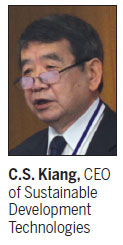China needs 'sustainable' urbanization
Updated: 2014-08-04 11:04
By Amy He in New York (China Daily USA)
|
||||||||

As its urbanization continues, China needs to use more renewable energies to reduce possible impact on the environment, said C.S. Kiang, founding dean of Peking University's College of Environmental Sciences, on Sunday at a conference in New York.
"In 15 or 25 years, Chinese urbanization is going to be the largest human activity ever undertaken. What's the possible ecological impact? I specifically stress that urbanization is not only a China issue. It's a global issue," Kiang said at a US-China economic and trade conference as part of the Vision and Innovation Forum at New York University.
"In order to meet the urbanization plan and in order for China to keep its GDP at 7.5 percent, it is a necessity to have urbanization, but it will be a very large and very challenging issue."
China's use of energy, oil and natural resources, for example, is slowly bringing countries in the Middle East into China's urbanization efforts and reform plans which will affect how those countries conduct business with China, Kiang said.
"The whole dynamics of the energy issue globally reflects a tremendously changing time. Saudi Arabia, for example: where are they going to sell the oil, if the situation in the United States is going to change?" he said. "They're very interested in the China market, so the United States feels that there's some threat for natural resources, and there's starting to be competition between the US and China."
People focus solely on the US-China relationship when it comes to China's implementation of urbanization, environmental and energy policies, but "the issue is not that simple.
Urbanization is not limited to US-China, it is also an issue in Dhabi, in the Middle East, in South Africa, in South America," said Kiang, who is currently CEO of Sustainable Development Technologies and councilor of the World Future Council.
Kiang said that China needs to shift from an over-reliance on coal and fossil fuels to using renewable and nuclear energy, as well as hydropower. He also said that there is a lack of across-the-board standards when it comes to reading and implementing data and discussions in general. There must be universal standards for urban development and measurable criteria to create these standards, he said.
"If we don't have standards, you can talk for years and never reach an agreement. Standards are important. Once you generate standards, you can generate small and medium industries," said Kiang.
Leo Lester, a research fellow at the King Abdullah Petroleum Studies and Research Center, a Saudi Arabia-based research institute, said that while China has a way to go with environmental and energy policies, it seems that it is committed to making the country more sustainable for its citizens.
"You can see the government is acting. They have also become much more focused on engaging, rather than just standing loosely and saying, 'We're not interested in this, America hasn't done this, why should we?' You'll see that the rhetoric has changed a lot," he said.
The 12th Five-Year Plan (2011-2015) included many listed targets for energy and carbon reduction - targets more substantial than those of other countries, he said.
"The government is committing itself to much beefier environmental targets than some other countries have. There's also been no backslide - you can find a couple of countries that have done a little bit of wiggling with their environmental commitments, so we haven't see that in China yet," Lester said.
amyhe@chinadailyusa.com
(China Daily USA 08/04/2014 page2)

 M6.5 quake hits SW China
M6.5 quake hits SW China
 10 Chinese cities that lifted property curbs in July
10 Chinese cities that lifted property curbs in July
 Culture Insider: Customs of Sanfu - the dog days of summer
Culture Insider: Customs of Sanfu - the dog days of summer
 Calligrapher brings distinctive script to US
Calligrapher brings distinctive script to US
 Chinese Consulate uses baseball as bridge for US ties
Chinese Consulate uses baseball as bridge for US ties
 M6.5 quake hits SW China
M6.5 quake hits SW China
 Shanghai Tower gets finishing touch
Shanghai Tower gets finishing touch
 'Diaper Derby' competition in New York
'Diaper Derby' competition in New York
Most Viewed
Editor's Picks

|

|

|

|

|

|
Today's Top News
US ready to help China in quake relief
China needs 'sustainable' urbanization
Opinion: US competes for better ties with Africa
Anti-terror fight will take time, expert believes
Half a million under water-related state-of-emergency in Ohio
Xinjiang offers cash rewards for those hunting terrorists
373 dead as strong quake jolts SW China
Xi:save people's lives first after quake
US Weekly

|

|






